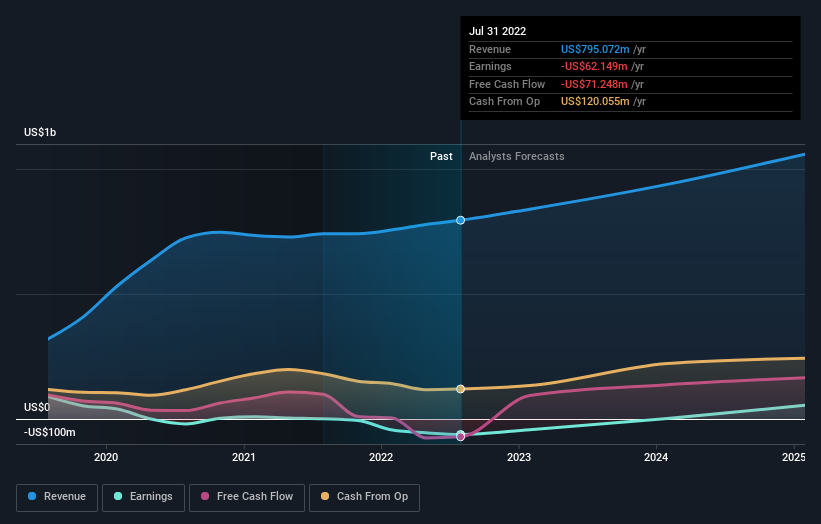Stock Analysis
- United States
- /
- Healthcare Services
- /
- NasdaqGS:HQY
HealthEquity (NASDAQ:HQY) shareholder returns have been favorable, earning 43% in 5 years

Stock pickers are generally looking for stocks that will outperform the broader market. And while active stock picking involves risks (and requires diversification) it can also provide excess returns. For example, the HealthEquity, Inc. (NASDAQ:HQY) share price is up 43% in the last 5 years, clearly besting the market return of around 33% (ignoring dividends). On the other hand, the more recent gains haven't been so impressive, with shareholders gaining just 12%.
Since it's been a strong week for HealthEquity shareholders, let's have a look at trend of the longer term fundamentals.
Check out our latest analysis for HealthEquity
To quote Buffett, 'Ships will sail around the world but the Flat Earth Society will flourish. There will continue to be wide discrepancies between price and value in the marketplace...' One imperfect but simple way to consider how the market perception of a company has shifted is to compare the change in the earnings per share (EPS) with the share price movement.
HealthEquity's earnings per share are down 56% per year, despite strong share price performance over five years.
Essentially, it doesn't seem likely that investors are focused on EPS. Because earnings per share don't seem to match up with the share price, we'll take a look at other metrics instead.
In contrast revenue growth of 29% per year is probably viewed as evidence that HealthEquity is growing, a real positive. It's quite possible that management are prioritizing revenue growth over EPS growth at the moment.
The graphic below depicts how earnings and revenue have changed over time (unveil the exact values by clicking on the image).

We consider it positive that insiders have made significant purchases in the last year. Even so, future earnings will be far more important to whether current shareholders make money. If you are thinking of buying or selling HealthEquity stock, you should check out this free report showing analyst profit forecasts.
A Different Perspective
We're pleased to report that HealthEquity shareholders have received a total shareholder return of 12% over one year. That's better than the annualised return of 7% over half a decade, implying that the company is doing better recently. In the best case scenario, this may hint at some real business momentum, implying that now could be a great time to delve deeper. It's always interesting to track share price performance over the longer term. But to understand HealthEquity better, we need to consider many other factors. Like risks, for instance. Every company has them, and we've spotted 2 warning signs for HealthEquity (of which 1 is a bit concerning!) you should know about.
If you like to buy stocks alongside management, then you might just love this free list of companies. (Hint: insiders have been buying them).
Please note, the market returns quoted in this article reflect the market weighted average returns of stocks that currently trade on US exchanges.
Valuation is complex, but we're helping make it simple.
Find out whether HealthEquity is potentially over or undervalued by checking out our comprehensive analysis, which includes fair value estimates, risks and warnings, dividends, insider transactions and financial health.
View the Free AnalysisHave feedback on this article? Concerned about the content? Get in touch with us directly. Alternatively, email editorial-team (at) simplywallst.com.
This article by Simply Wall St is general in nature. We provide commentary based on historical data and analyst forecasts only using an unbiased methodology and our articles are not intended to be financial advice. It does not constitute a recommendation to buy or sell any stock, and does not take account of your objectives, or your financial situation. We aim to bring you long-term focused analysis driven by fundamental data. Note that our analysis may not factor in the latest price-sensitive company announcements or qualitative material. Simply Wall St has no position in any stocks mentioned.
About NasdaqGS:HQY
HealthEquity
Provides technology-enabled services platforms to consumers and employers in the United States.
Reasonable growth potential with adequate balance sheet.

